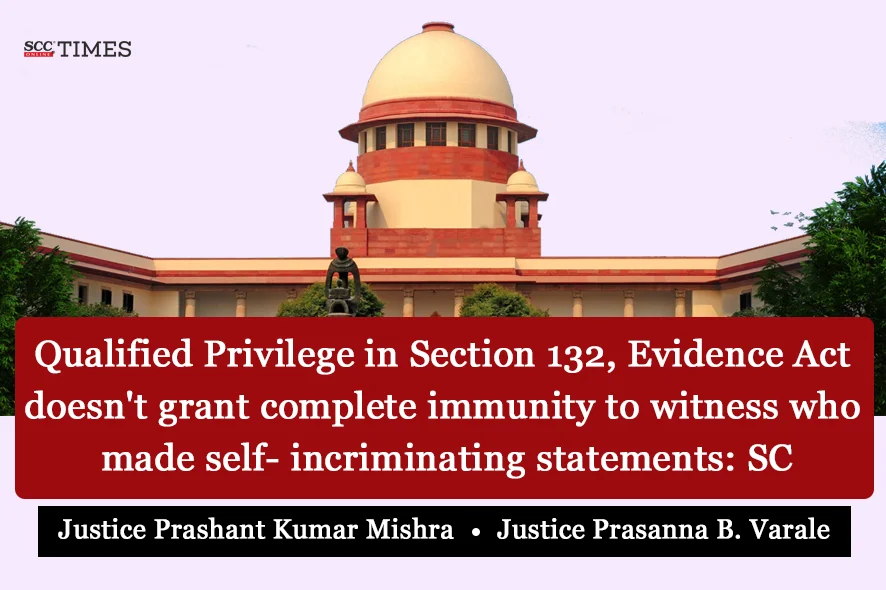Supreme Court: While considering the instant appeal, wherein the Court had to decide whether the appellant was entitled for protection under Section 132 of the Evidence Act, 1872 as his statement was recorded earlier at the pre-summoning stage as a witness for the respondent bank; the Division Bench of Prashant Kumar Mishra* and Prasanna B. Varale, JJ., held that the qualified privilege under the proviso to Section 132 of the Evidence Act, 1872, does not grant complete immunity from prosecution to a person who has deposed as a witness and made self- incriminating statements.
The Court further held that there cannot be an absolute embargo on the Trial Court to initiate process under Section 319 CrPC., merely because a person, who though appears to be complicit, has deposed as a witness. The finding to invoke Section 319 CrPC must be based on the evidence that came up during Trial. There must be additional, cogent material before the Trial Court apart from the statement of the witness.
Background:
In 1998, the accused (since deceased) who was the mother of the then President (also accused) of the respondent bank, moved an application for creating a Fixed Deposit of Rs. 10,00,000 (10 Lakhs) for a period of 3 years with the respondent bank, with her in the capacity as the President of Shyam Sunder Shyam Sansthan, Datia, Madhya Pradesh. The amount was deposited with the vide 2 separate deposits of Rs. 8.5 Lakhs and Rs. 1.5 Lakhs respectively. However, subsequently, these challans were interpolated under the initial of the appellant who was working as the Cashier of the respondent bank at the relevant time. Due to the interpolation, the FD for 3 years was converted to Fixed Deposit for 10 years by committing forgery. In the bank ledger also interpolation and forgery were made by striking off the period of “3 years” to make “15 years” under the initial of the appellant.
When a criminal complaint was filed, the appellant was also examined as one of the witnesses of the respondent bank, wherein he admitted having changed the tenure of the Fixed Deposit from 3 years to 10 years and later to 15 years. This statement by the appellant was recorded at the pre-summoning stage on 19-03-2016.
However, during the trial, the prosecution witness in his examination-in-chief, named the appellant as the one who committed the interpolation of the FDs. Consequently, the respondent bank applied under Section 319 CrPC for arraying the appellant and one other as additional accused. The Trial Court vide its order dated 17-04-2023 allowed the application partly by summoning the appellant, while rejecting the same for the other person. Pursuant to the summoning, charges were framed against the appellant.
The appellant challenged the afore-stated Trial Court order before Madhya Pradesh High Court; however, the challenge was met with disappointment as the High Court affirmed the Trial Court’s order. Hence the appellant approached the Supreme Court.
Contentions:
Counsel appearing for the appellant has argued that the appellant was entitled to the benefit under Section 132 of the Evidence Act, 1872 and he could not be held accountable for the statement made by him. It is also argued that the evidence available on record do not make out any prima facie case. Furthermore, it was stated that power under Section 319 CrPC can be exercised only in a case when there is prima facie material giving rise to grave suspicion against the person with respect to commission of offence.
Per contra, the respondent’s counsel argued that since the appellant was made accused based on statement made by prosecution witness in course of trial and not on the basis of the appellant’s pre-summoning statement recorded on 19-03-2016, therefore, Section 132 of Evidence Act, has no application in the facts and circumstances of the case.
Court’s Assessment:
Sweep and Import of S. 132, Evidence Act, 1872
Perusing the facts of the case and the issue for consideration, the Court examined S. 132 to understand the understand the principle on which this provision was introduced in the statute.
It was noted that proviso to Section 132 is based on the maxim Nemo tenetur prodere seipsum i.e. no one is bound to incriminate himself and to place himself in peril. The Court also took note of English Law, wherein a witness need not answer any question, the tendency of which is to expose the witness, or to feed hand of the witness, to any criminal charge, penalty or forfeiture. The Court further pointed out that, “The privilege is based on the principle of encouraging all persons to come forward with evidence, by protecting them, as far as possible, from injury or needless annoyance in consequence of so doing. This absolute privilege, in some cases tended to bring about a failure of justice, for the allowance of the excuse, particularly when the matter to which the question related was in the knowledge solely of the witness, deprived the court of the information which was essential to its arriving at a right decision”.
However, in Indian law, to avoid the afore-stated inconvenience, Section 132 withdrew this absolute privilege and affords only a qualified privilege. The witness is deprived of the privilege of claiming excuse from testifying altogether; but, while subjecting him to compulsion, the legislature, in order to remove any inducement to falsehood, declared that evidence so obtained should not be used against him, except for the purpose declared in the Evidence Act.
The Court also pointed out that the proviso to Section 132 is also an extension of the protection enshrined under Article 20(3) of the Constitution which confers a fundamental right against self-incrimination and its necessary corollary.
Under the constitutional scheme, the right is available only to a person who is accused of an offence; however, the proviso to Section 132 in extension, creates a statutory immunity in favour of a witness who in the process of giving evidence in any suit or in any civil or criminal proceeding, makes a statement which incriminates himself.
Hence, the legislative history reveals the provision’s object is to secure evidence which could not have been obtained. The purpose for granting such statutory immunity was to enable the Court to reach a just conclusion. The Court agreed with the view taken by the Supreme Court in R. Dinesh Kumar v. State, (2015) 7 SCC 497, to the extent wherein it stated that no prosecution can be launched against the maker of a statement falling within the sweep of Section 132 on the basis of the “answer” given by a person while deposing as a “witness” before a Court.
However, it was also pointed out that the Division Bench in R. Dinesh Kumar (supra), refused to consider whether a witness protected under the proviso of Section 132, could be separately prosecuted if independent evidence is also available.
Taking note of the instant case’s facts, the Court felt compelled to consider the matter in a different perspective as to when (apart from his own statement made by a witness) is the appellant still protected under the proviso of Section 132, when there are other materials against him for summoning as an accused.
Citing examples, the Court opined that if the privilege made available to a witness under the proviso to Section 132 of Evidence Act, is interpreted as complete immunity, notwithstanding availability of other evidence, then it is capable of abuse.
Qualified Privilege and the course of direction available to a Court under S. 319, CrPC
Given the facts of the instant case, the Court had to consider that-
-
When qualified privilege under the proviso to Section 132 of the Act, grants complete immunity to a person who has deposed as a witness (and made statements incriminating himself), notwithstanding the availability of other material with the prosecution?
-
Whether a Court while trying an offence, is barred from initiating process under Section 319 of CrPC against a witness in the said proceeding based on other material on record?
The Court opined that it is not fathomable that a provision in the Evidence Act, the primary purpose of which was to ensure that all the material is before the Court and ensure that the ends of justice are met, could itself grant a blanket immunity to a witness (albeit complicit). Such an interpretation would be unsustainable. “Needless to say, that his statement cannot be used for any purpose whatsoever for the purposes of bringing such witness to trial”.
The Court then considered the course of direction available to a Court, which during trial is confronted with evidence, other than the statement of the witness (against whom incriminating material is available); whether the Court can rely upon the statement of the witness for invoking the provisions of Section 319, CrPC; and whether reference to any statement tendered by the witness would vitiate the order under Section 319 CrPC.
The Court held that there cannot be an absolute embargo on the Trial Court to initiate process under Section 319 CrPC, merely because a person, who though appears to be complicit, has deposed as a witness. An order for initiation of process under Section 319 CrPC against a witness, who has deposed in the trial and has tendered evidence incriminating himself, would be tested on the anvil that whether only such incriminating statement has formed the basis of the order under Section 319 CrPC.
Mere reference to such a statement would not vitiate the order. The test would be that even if the statement of witness is removed from consideration, whether the Court could have proceeded under Section 319, CrPC based on other incriminating material.
Decision:
Applying the afore-stated assessment on the facts of the instant case, it was pointed out that appellant had been summoned as an additional accused under Section 319, not only based on his pre-summoning statement, but on the basis of the statement of prosecution witness. Thus, the Court noted that it is a case where the appellant has been summoned as an additional accused based on the statement of the prosecution witness.
The only protection available under the proviso to Section 132, Evidence Act is, a witness cannot be subjected to prosecution based on his own statement. It nowhere provides that there is complete and unfettered immunity to a person even if there is other substantial evidence or material against him proving his prima facie involvement. “If this complete immunity is read under the proviso to Section 132 of the Act, an influential person with the help of a dishonest Investigating Officer will provide a legal shield to him by examining him as a witness even though his complicity in the offence is writ large on the basis of the material available in the case”.
Finally, the Court decided that there was prima facie material for exercise of power under Section 319 CrPC as the prosecution witness categorically stated in the examination-in-chief that the interpolations in the FDs had been made under the initials and signatures of the appellant. Hence the Court deemed it fit to dismiss the appeal.
CASE DETAILS
|
Citation: Appellants : Respondents : |
Advocates who appeared in this case For Petitioner(s): For Respondent(s): For impleader: |
CORAM :











